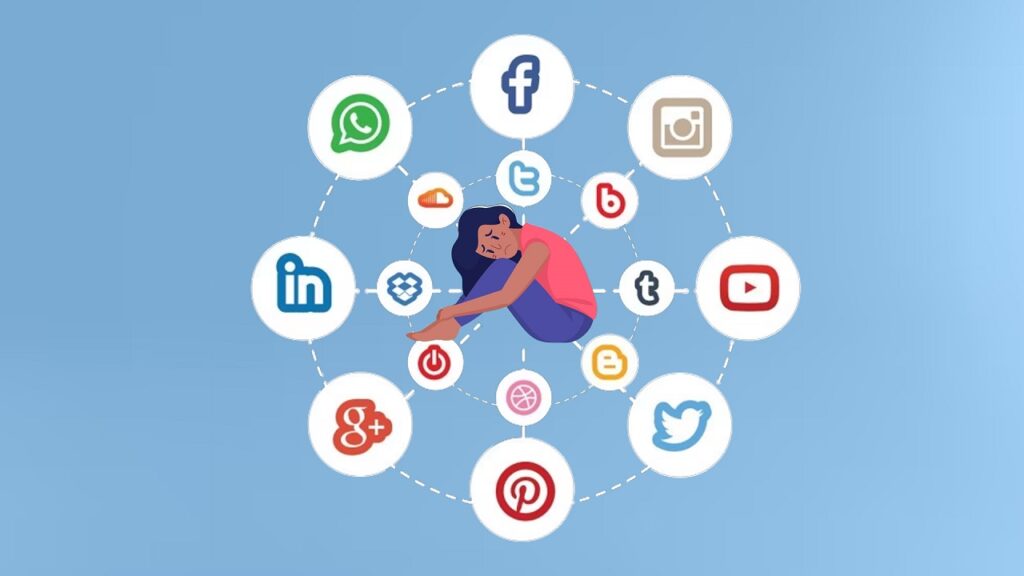
The Influence Social Media has become a fundamental part of modern life, shaping how we interact, communicate, and perceive the world. However, its influence extends beyond social connections, impacting mental health in both positive and negative ways. This article explores the complex relationship between Social Media and mental health, providing insights into its effects, discussing notable examples, and offering strategies for managing its impact.
The Influence and Negative Impacts of Social Media on Mental Health
Social Media platforms offer numerous benefits, including the ability to connect with friends and family, access to information, and opportunities for self-expression. For many, Social Media is a source of support and community, particularly for those who may feel isolated in their offline lives. Online groups and forums can provide a sense of belonging and access to resources that support mental well-being The Influence.
However, the impact of Social Media on mental health is not universally positive. The constant exposure to curated content and idealized images can lead to feelings of inadequacy, low self-esteem, and anxiety. Social Media often presents a highlight reel of others’ lives, which can create unrealistic standards and exacerbate feelings of comparison. Additionally, cyberbullying and online harassment are significant concerns that can profoundly affect mental health, leading to stress, depression, and other issues. The Influence
Notable Examples of Social Media’s Influence on Mental Health
Several studies and real-world examples illustrate how Social Media can affect mental health. These examples highlight the varied ways in which social platforms can influence emotional and psychological well-being.
- Influence on Body Image: Research has shown that exposure to idealized body images on Social Media can contribute to body dissatisfaction and disordered eating behaviors. Platforms like Instagram, where users often post edited and curated images, can perpetuate unrealistic beauty standards and negatively impact self-esteem.
- Impact on Sleep: The use of Social Media, particularly before bedtime, has been linked to sleep disturbances. The blue light emitted by screens can interfere with sleep patterns, and engaging in online activities can lead to late-night usage, contributing to poor sleep quality and increased risk of mental health issues. The Influence
- Cyberbullying and Harassment: Social Media has become a common platform for cyberbullying, which can have severe consequences for mental health. Victims of online harassment may experience increased levels of anxiety, depression, and even suicidal thoughts. The anonymity of the internet can exacerbate the problem, making it harder for individuals to seek help.
- FOMO and Anxiety: The phenomenon of “Fear of Missing Out” (FOMO) is prevalent on Social Media, where users often see posts about events and activities they are not part of. This constant exposure can lead to feelings of exclusion and anxiety, as individuals compare their own lives to the seemingly perfect lives of others.
Strategies for Managing Social Media’s Impact on Mental Health
To mitigate the negative effects of Social Media on mental health, it’s important to implement strategies that promote healthy usage and foster a positive online experience.
- Set Usage Limits: Establishing boundaries for Social Media use can help manage its impact on mental health. Setting specific times for checking social platforms and avoiding usage before bedtime can reduce the risk of sleep disturbances and excessive screen time.
- Curate Your Feed: Follow accounts that promote positive content and unfollow or mute accounts that cause stress or anxiety. Curating your feed to include uplifting and supportive content can create a more positive online environment.
- Practice Digital Detoxes: Taking breaks from Social Media can help reset your mental well-being. Engaging in offline activities, spending time with loved ones, and focusing on hobbies can provide a necessary reprieve from online pressures.
- Seek Professional Help: If Social Media is contributing to significant mental health issues, seeking support from a mental health professional is crucial. Therapy can help address underlying concerns and develop coping strategies for managing the impact of Social Media.
- Promote Online Positivity: Engage in positive online interactions and support others who may be struggling. Contributing to a supportive and respectful online community can help improve overall experiences on Social Media.
Conclusion
The influence of Social Media on mental health is multifaceted, with both beneficial and detrimental effects. While Social Media offers valuable opportunities for connection and self-expression, it also poses risks that can impact emotional and psychological well-being. By adopting strategies to manage Social Media use and focusing on positive online interactions, individuals can mitigate negative effects and enhance their mental health. https://www.artemishospitals.com/blog/articles-by-doctors/the-impact-of-social-media-on-mental-health
Understanding and navigating the relationship between Social Media and mental health is essential for fostering a healthy online environment and promoting overall well-being. Through mindful usage and supportive practices, we can harness the positive aspects of Social Media while addressing its potential challenges.
